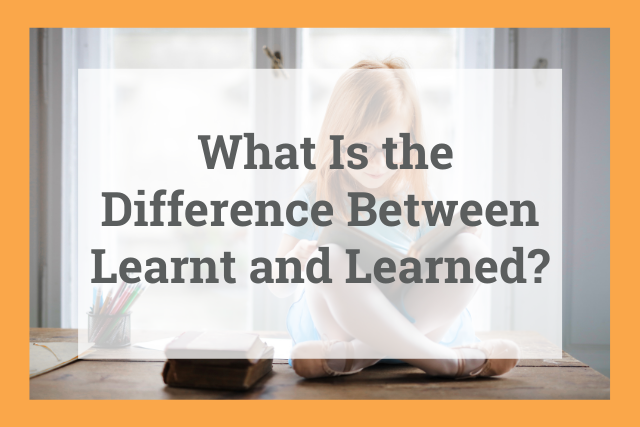
Do you ever spend ages staring at a word, wondering if you have spelled it correctly?
Often, even if you have got it right, you will second-guess and convince yourself it is wrong. Consider the following example:
- I learned to ride a motorbike last year while on holiday in Greece.
At first glance that sentence looks fine, but then you start to wonder—is learned spelled correctly? Consider the alternative:
- I learnt to ride a motorbike last year while on holiday in Greece.
That looks right too, doesn’t it? Or does it?
Unfortunately, one of the joys of language, and in particular the English language, is that there are so many variations in the rules.
In most cases, as we will see below, those variations are regional, because English has spread so far and wide.
That is the case for the two words we'll be looking at today—learnt and learned.
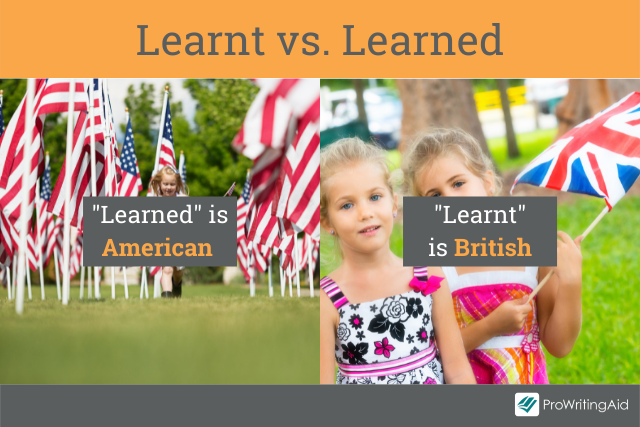
What Is the Difference Between Learnt vs Learned?
Despite being spelled differently, in most cases they both mean exactly the same thing. Both learnt and learned are the past tense version of the verb to learn.
The only difference between the two words is that “learned” is the accepted spelling if you live in the United States or Canada, and “learnt” is the accepted spelling in the UK and other English-speaking countries.
However, it is important to know that both are perfectly acceptable to use, so don’t worry if you find yourself thinking that you have spelled one of them wrong!
Quick note: There is also an adjective learned which is always spelled with -ed and is pronounced learn-ed. More on this later.

What Do Learned and Learnt Mean?
To learn means "to acquire knowledge or information," so learned or learnt mean you acquired that knowledge in the past.
If you’re from the US, you might say:
- I learned math in high school.
If you’re from the UK, you might say:
- I learnt maths in secondary school.
Just like with math / maths, the only differences between learned and learnt are the spelling and regions where they are each used.
Is Learnt Grammatically Correct?
Absolutely, yes! Learnt is used for the past tense form and past participle of the verb to learn by speakers of British English.
British English speakers will say learnt when referring to some sort of knowledge or information that they learned in the past. Thus, you would say, She learnt to play hockey at boarding school in Sussex. Consequently, when a British person is writing, or when someone is writing for a British publication, learnt is the correct way of writing it.
However, two other things are worth noting. Firstly, that the use of learned is also correct and is growing in popularity. Secondly, that the most important rule (not just here but in any circumstances where such issues come up) is to be consistent.
Whichever spelling you use the first time the word comes up, must be the same spelling you then use all the way through your writing.
How Do I Use Learnt in a Sentence?
- Anyone who learnt maths the old-fashioned way would have no idea how this new system works.
- That boy still hasn’t learnt his lesson.
- I learnt so much about life from watching Downton Abbey.
- I learnt to play the accordion four years ago.
- We learnt about the earthquake via social media.
When Do British People Use Learnt?
This depends on the writer. It is acceptable to use learnt or learned in British English. Some publications, like newspapers or websites, may have a style guide that tells its writers to use learnt, as in these headlines:
- Emma Raducanu: “I learnt so much from Wimbledon”—British teenager ready for US Open qualifying (BBC News)
- “How I Learnt to Love Atheists” by John Ward (The Guardian)
If you frequently mix up learned and learnt, install our browser extension to check your writing for consistent spelling across email, social media, online forms, and millions of other sites.
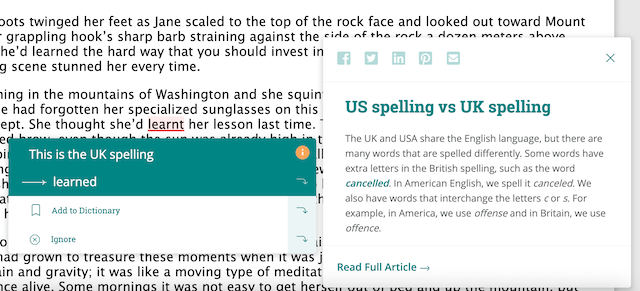
Set it to American English or British English and it will recognise the appropriate forms that are common in British English or American English and ensure you use the correct spelling.
Try ProWritingAid for free now.
Is Learned Grammatically Correct?
Yes, learned is just as grammatically correct as learnt. It is also more widely used, so people are less likely to think of it as an incorrect spelling.
Learned is used for the past tense form and past participle of the verb to learn by speakers of American English.
Speakers of American English will use learned in the same way that British English speakers use learnt—when referring to some sort of knowledge or information that they learned in the past. Thus, you would say, He learned to play soccer at high school in Seattle. Therefore, when an American person is writing, or someone is writing for an American publication, learned is the correct usage.
As noted above, neither learned or learnt would technically be wrong, as long as you pick one and use it consistently.
How Do I Use Learned in a Sentence?
- We learned so much about life from watching The Real Housewives of Orange County.
- She learned to tie her shoelaces much quicker than he did.
- James learned to dance by repeatedly watching Saturday Night Fever.
- I learned to play the double bass when I was four years old.
Sheila first learned about her husband’s affair whilst browsing on YouTube.
When Do Americans Use Learned vs. Learnt?
American English speakers will almost always use learned, unless they're writing for a British English publication.
- “What We Learned and When We Learned It” by Andy Borowitz (NY Times)
- “I Learned How to Crochet in One Day with This Simple Kit” by Meghan Kavanaugh (USA Today)
Is Learnt a Word in Australian English?
Yes, it is. Most English-speaking countries around the world still frequently use the British English form of learnt. The only exceptions are the US and Canada.
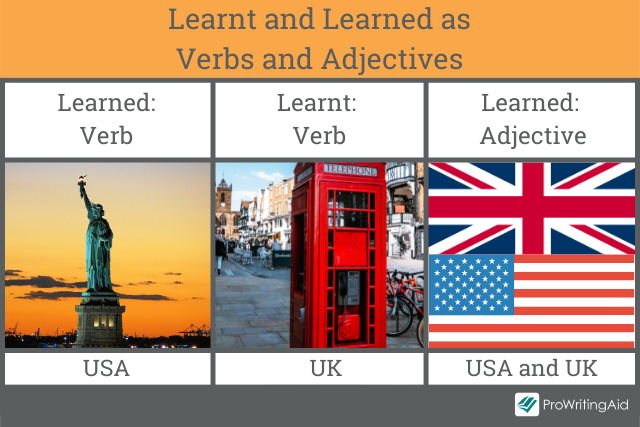
Can I Use Learned as an Adjective?
There is one situation in which learnt and learned are not interchangeable, and that is when learned is used as an adjective.
The word learned can be used as an adjective when you want to describe a person or an object (such as a book) as scholarly.
Thus, you might say that someone is the most learned individual I have ever met or you might say of a periodical that it is a learned journal with detailed reviews of the latest poetry collections.
The main point however, when using learned as an adjective, is that you can only use learned with the American spelling. There is no such adjective as learnt.
Also, when it is used as an adjective it is pronounced slightly differently, with two distinct syllables in learn-ed rather than the one syllable learnd.
How Do I Use Learned as an Adjective?
Usually, you will use learned as an adjective by placing it before a noun, such as friend or colleague (i.e. the person you want to describe as scholarly).
- We are gathered here tonight to honour our learned colleague.
- The old, learned scientist looked at the government ministers he was advising and inwardly wept.
Why Are There Two Spellings of Learnt and Learned?
There are numerous word variations like learned / learnt in the English language—such as dreamed / dreamt, passed / past, leaped / leapt, spelled / spelt, or burned / burnt.
Regular and irregular verbs have been around since Middle English was first spoken.
However, the tendency in American English has always been towards making irregular verbs into regular verbs, and that appears to be happening in British English too.
As a consequence, the -ed ending is becoming more popular around the world and with the learned / learnt example in particular, the use of learnt seems to be dying out as learned goes from strength to strength—even in British English areas.
According to Google Ngram, learnt is very rarely used at all in American books, magazines, or journals whilst in British books, magazines, and journals, both are used.
Google Ngram also reveals that learned is now the preferred choice in British English too (although it is possible this result is taking into account the adjective learned).
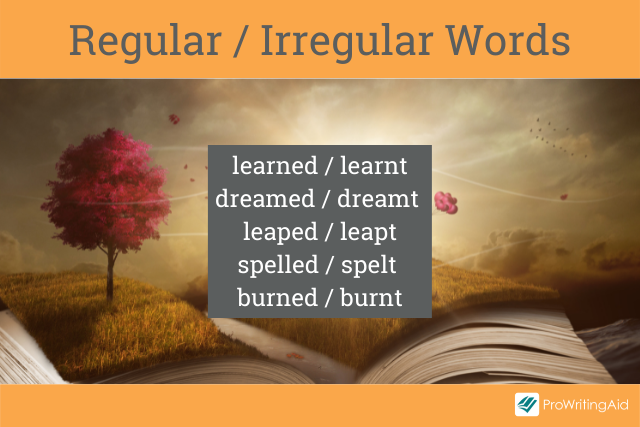
Can I Use Learned or Learnt?
So, what have we learned? That use of learned or learnt as verbs will depend on where you live or which country you are writing for (but both are acceptable in any country) whilst learned is the only correct spelling when used as an adjective.
Just as how you spell cancelled or canceled depends on whether you are from the UK or the US, so are you only likely to use learnt if you come from the UK.
And even then, as we have seen, this difference between the American and British English is dying out, as American English becomes more influential throughout the world and the easier, regular American spelling takes hold.


